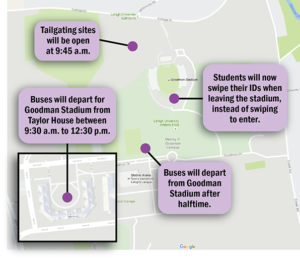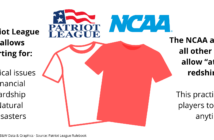
Designed by Kelly McCoy
Before the Mountain Hawks’ home opener, a mass of students who only came to attend tailgates stood along Goodman Drive waiting for a bus to take them back to campus. They didn’t know one wouldn’t come for them until after halftime.
Between the first and second home games, the Interfraternity Council met with Lehigh Athletics and the Lehigh University Police Department to discuss game-day transportation. This meeting allowed IFC and Panhellenic Council leaders to communicate to their chapters that buses would not leave Goodman Stadium until after halftime, Mark DiMaggio, ’17, the vice president of IFC, said.
Because this hadn’t been clearly communicated before, students assumed this was a new change, but Allen Biddinger, the director of athletic facilities and events, said buses have been waiting until the half to leave for at least 10 years.
When Biddinger met with IFC officers, he said he was a little surprised when he realized they weren’t aware that buses didn’t leave football games until after halftime.
Rich Haas, the assistant athletic director for sales and marketing, said the change was really just better communication of the policy to students.
“The rationale of the buses leaving after halftime is the idea that you’re coming over for tailgates, but the reason for the tailgates is the football game,” Haas said.
A change that was made in between the first and second home games is that instead of students swiping in to the game to get credit for being there, students now swipe out, starting with the conclusion of the band performance.
This change came from an idea presented by students, Haas said, because in the first game many students could be seen leaving right after swiping in. At the Mountain Hawks’ first home game, 1,004 students swiped in. At the second game, when only swipe-outs were credited, only 350 students were accounted for, but the accuracy is unclear given it was the first time implementing the new system.
Haas said the problem of “swipe-in leavers” is a national issue, not one just found at Lehigh.
“We’re trying to find ways to combat it because really the people that should get credit for being at the game are the people that at least attended it and supported and cheered,” Haas said.
At Lehigh, this issue matters because the students who are credited with attending the most games get earlier access to buying Lehigh-Lafayette tickets.
Students are divided into tiers depending on how many games they’ve attended and are given a day to purchase tickets depending on their tier. Tickets for the Lafayette game go on sale Oct. 4, Haas said, and since the game is at Lafayette this year, only about 3,000 student tickets are available for purchase.
To find new ways to encourage more students to go to and stay at football games, both Biddinger and Haas said they constantly ask for student feedback. Over the past few years, these student-inspired changes included opening the tailgate lot 45 minutes earlier — at 9:45 a.m. — and having buses pick students up behind Taylor House instead of in front of Grace Hall.
Despite these changes, student attendance at games, which Biddinger said has been slowly declining for years, has still not increased.
“We made these concessions and tweaks to the (tailgate) policy with the expectation that on the other side student leaders in different groups would help drive different numbers,” Haas said. “So that end of the deal has not been met.”
Students have been encouraged more to wear brown and white to games, as opposed to MoCos attire, and DiMaggio said this will continue to be encouraged by IFC.
“We have seen a considerable increase in attendance since chapters have promoted the otherwise simple idea of wearing school colors on game day,” DiMaggio wrote in an email. “Its adoption has seen a favoring of tailgates over MoCos, and attendance over departure from Goodman.”
DiMaggio said that issue lies more in the concept of MoCos itself, saying organizations that choose to host MoCos on game days “choose to disrespect the football team.” He said IFC’s judicial board plans to investigate Greek organizations that host or attend MoCos instead of attending the football game.
During his first game as a freshman, junior tight end Mike Baur remembers being confused by the students who showed up to the game dressed in bright colors and tutus. He said if people love Lehigh, they should show support when they’re at the games.
Despite the numbers not showing much change, Baur does feel that student support is improving.
“For awhile, our football team kind of felt like we were an outcast, no one came to see us,” Baur said. “But I feel like it’s getting better. I know that the school is going through a lot right now with MoCos and trying to change things around, so I’d like to see where that’s going.”
Prior to the MoCos era, numbers of tailgates and students at home games were big, Haas said.
“People came — they went to tailgates, they went to the game, it just seemed natural,” Haas said. “Now it seems, for a lot of students (it’s) unnatural to go to the game, which doesn’t make sense.”





Comment policy
Comments posted to The Brown and White website are reviewed by a moderator before being approved. Incendiary speech or harassing language, including comments targeted at individuals, may be deemed unacceptable and not published. Spam and other soliciting will also be declined.
The Brown and White also reserves the right to not publish entirely anonymous comments.
1 Comment
Saying “if you’re not going to go to the football game, you’re not allowed to do anything else” is a hilarious bit of dictatorship out of the ever out of touch Lehigh administration. Disrespecting the football team? Get out of town.
Keep on breeding a generation of non-donor alumni though…let’s see how that plays out.